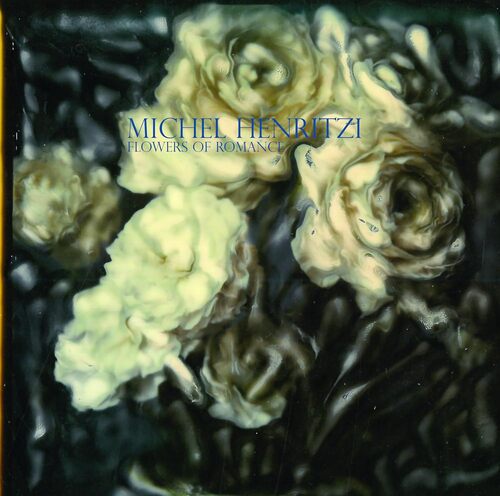Listening to Harold Melvin & The Blue Notes' "Wake Up Everybody" I get a sudden striking flash of Michel Henritzi at work. To me Michel is first and foremost a working man, be it in Dustbreeders the Metz originating so called "noise" outfit, or in his collabs with a wide and varied range of Japanese comrades such as Tetuzi Akiyama, Fukuoka Rinji and of course Junko, always retaining his name as the anchor point of a free man. Freed from the salaried workers yoke, the worker can claim his own name, Michel Henritzi; and paint the world and it's ugly oppressive separation morphing into the future of an indescribable liberation. It takes time to do so and the work unravels here over 2 full sides recorded in a live situation. Against the "abat faim" (Guy Debord in "the Encyclopedia of Nuisances") of canned music the work of Michel Henritzi creates a lived in situation that, in praxis, embodies the grinding destruction of exploitation and the struggle against it. Michel Henritzi works as Penelope hunched over his tool, a lapsteel, protected by his workers cap which is also a military attribute. When the work is done is it now made possible to be done again, always different, unlike mass produced commodities it is the work of a sole man working within the frame of a disjointed society, trying to weave it back together. This evolving repetition against decay reminds me in turn of "MMMM (My Metal Machine Music)" the work of another Japan enthusiast, Magic Aum Gigi, French member of Acid Mother's Temple. Perhaps also because of both works' inscription in the history of rebel music by their title's reference to previous masterpieces by Lou Reed and, here, Public Image Limited, instilling their irrepressible venom in your contemporary listening experience. An intertextual dialogue is established.But Michel Henritzi is also a writer, he is also a label owner (publishing Keiji Haino's "C'est parfait" endoctriné tu tombes la tête la première, etc) and he is also non exhaustively described: A worker, a scholar, etc. In "Aesthetics of resistance" Peter Weiss describes artistic research in action and how it is possible (and crucial to a revolutionary mind) to revisit the great works of humanity in view of the oppression that produced them. It is my fantasy and honor to present Michel Henritzi's work, "Flowers of romance", as part of this rich tapestry of class struggle.
Release date:
December 1, 2023
Label:
Install our app to receive notifications when new upcoming releases are added.

Recommended equipment and accessories
-

Turntables - Top Picks
A selection of reliable record players you can buy today, for every budget
-

Vevor Ultrasonic Cleaner
Thoroughly clean and restore your vinyl records, removing dust, dirt, and grime from every groove without damaging the surface
-

Ortofon 2M Red Cartridge
Features an elliptical stylus that accurately tracks the grooves of vinyl records, delivering a rich, detailed sound with an output voltage of 5.5 mV
-

Pro-Ject Debut Carbon EVO
Featuring a one-piece carbon fiber tonearm, precision-tuned motor, and a heavy steel platter with TPE damping, it ensures superior stability and sound quality.
-

Audioengine A2 Plus
Precision-engineered 2.75-inch woofers and a 0.75-inch silk dome tweeter, featuring built-in DAC and Bluetooth connectivity for seamless integration.
Featured Upcoming Vinyl
-

Spencer Mackenzie Empty Chairs
Gypsy Soul Records
February 20, 2026 -

STILLBIRTH SURVIVAL PROTOCOL
Reigning Phoenix Music America, LLC
January 30, 2026 -

Quicksand Manic Compression
Iodine Recordings
February 13, 2026 -

Field Music Field Music (20 Year Anniversary Edition) [2xLP]
Memphis Industries
December 12, 2025 -

Silversun Pickups Tenterhooks
New Machine Recordings
February 6, 2026 -

Lande Hekt Lucky Now
Tapete Records
January 30, 2026 -

Sassy 009 Dreamer+
Pias America
January 16, 2026 -

Hen Ogledd DISCOMBOBULATED
Domino Record Co
February 20, 2026 -

Olivia Rodrigo Live From Glastonbury _ A BBC Recording (Light Blue/Cobalt) [2xLP]
Geffen
December 5, 2025 -

Heavensgate ANGEL HYMNS
Pure Noise Records
December 19, 2025 -

Coach Party Caramel (Splatter with Zine)
Universal UK
December 5, 2025 -

Lionheart Valley of Death II (Black, Blue, White Marbled)
Arising Empire
February 6, 2026 -

Art School Girlfriend Lean in
Fiction
March 13, 2026 -

Harvey Sutherland Debt
Clarity
December 12, 2025


















